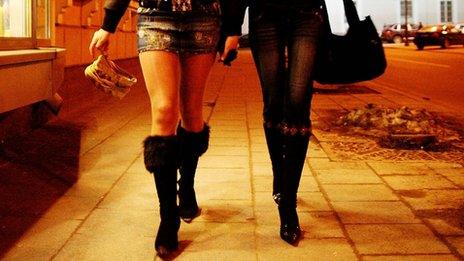Human trafficking victims will no longer be prosecuted, say police
- Published

A summit on human trafficking held in Edinburgh last year found that there were 93 suspected victims of the crime in Scotland in 2011
Human trafficking victims forced to work as sex slaves or in cannabis factories will no longer be prosecuted, Police Scotland has promised.
A team of officers dedicated to tackling people smuggling has been set up under the new single police force.
Following the news, Labour MSP Jenny Marra called on the Scottish government to review all convictions where the accused may have been trafficked.
The government said it was working on new laws to crack down on trafficking.
Assistant Chief Constable Malcolm Graham, head of major crime and public protection, said the new approach aimed to identify victims of human trafficking rather than criminalising them.
However, Ms Marra called on the government to go one step further and review the cases of prisoners who were possible victims of trafficking.
"There are more victims of human trafficking in our jails than traffickers," she said.
"We have victims in our Scottish jails tonight, people who have been forced to commit crime against their will.
"I'm calling on the government to use the resources at its fingertips to look back at cases for victims of trafficking."
A summit on human trafficking held in Edinburgh last year found that there were 93 suspected victims of the crime in Scotland in 2011.
Many victims are smuggled into the country to work in the sex trade, drugs trade, or for domestic slavery.
In January, three Slovakian nationals were jailed for three years each for smuggling two people into the country, one of whom was to be used in a "sham" marriage.
Matter for the courts
The Scottish government said any retrospective review of convictions would be a matter for the courts, but said it welcomed the move to a victim-centred approach by police.
A spokesperson said: "We are already strengthening legislation to provide a statutory aggravation so courts can take into account the fact that a separate offence being prosecuted took place in the context of human trafficking.
"We are also working with the Crown Office to consider whether any loopholes need closed."
A new EU directive due to be introduced on 6 April gives member countries the right not to prosecute victims of human trafficking for criminal activities.
- Published14 January 2013
- Published14 October 2012
- Published13 September 2012